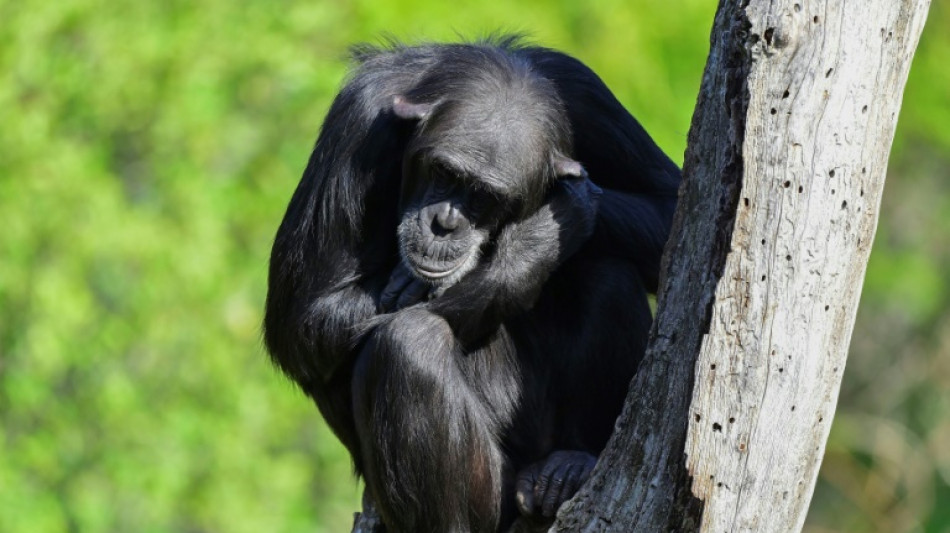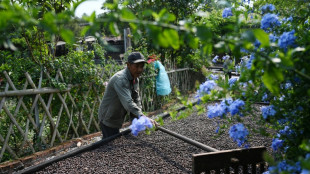
-
 Inter downed by Roma, AC Milan bounce back with victory in Venice
Inter downed by Roma, AC Milan bounce back with victory in Venice
-
Religious hate has no place in France, says Macron after Muslim killed in mosque

-
 Last day of Canada election campaign jolted by Vancouver attack
Last day of Canada election campaign jolted by Vancouver attack
-
Barcelona crush Chelsea to reach women's Champions League final

-
 Nine killed as driver plows into Filipino festival in Canada
Nine killed as driver plows into Filipino festival in Canada
-
Germany marks liberation of Bergen-Belsen Nazi camp

-
 Hojlund strikes at the death to rescue Man Utd in Bournemouth draw
Hojlund strikes at the death to rescue Man Utd in Bournemouth draw
-
Zelensky says Ukraine not kicked out of Russia's Kursk

-
 Zverev, Sabalenka battle through in Madrid Open, Rublev defence over
Zverev, Sabalenka battle through in Madrid Open, Rublev defence over
-
Ruthless Pogacar wins Liege-Bastogne-Liege for third time

-
 Bumrah claims 4-22 as Mumbai register five straight IPL wins
Bumrah claims 4-22 as Mumbai register five straight IPL wins
-
No place for racism, hate in France, says Macron after Muslim killed in mosque

-
 Greenland leader says Trump's threats disrespectful
Greenland leader says Trump's threats disrespectful
-
Spain's Alex Marquez celebrates maiden MotoGP in home Grand Prix

-
 Iran's president visits site of port blast that killed 28
Iran's president visits site of port blast that killed 28
-
French rapper Jul breaks attendance record at national stadium

-
 Gaza ministry says hundreds of war missing confirmed dead, toll at 52,243
Gaza ministry says hundreds of war missing confirmed dead, toll at 52,243
-
Crowds flock to Pope Francis tomb, as eyes turn to conclave

-
 'Godfather' director Coppola bags lifetime achievement award
'Godfather' director Coppola bags lifetime achievement award
-
Assefa sets world record, Sawe destroys high class field in London marathon

-
 'No excuse': Real Madrid's Rudiger after throwing object at ref
'No excuse': Real Madrid's Rudiger after throwing object at ref
-
Fire blazes day after Iran port blast killed 28, injured 1,000

-
 Real Madrid meltdown after third Clasico defeat inevitable end to ugly weekend
Real Madrid meltdown after third Clasico defeat inevitable end to ugly weekend
-
Nine killed as driver plows into Vancouver festival crowd

-
 Crumbs! Should French bakeries open on May 1?
Crumbs! Should French bakeries open on May 1?
-
All eyes turn to conclave as Pope Francis tomb opens to public

-
 Emotional Penge bounces back from betting ban for first DP Tour win
Emotional Penge bounces back from betting ban for first DP Tour win
-
25 killed, 1,000 injured in huge Iran port blast

-
 Greenland PM visits Denmark as Trump threats loom
Greenland PM visits Denmark as Trump threats loom
-
Philippines, US test air defences as China seizes reef

-
 25 killed, fires still burning in huge Iran port blast
25 killed, fires still burning in huge Iran port blast
-
India and Pakistan troops exchange fire in Kashmir

-
 Eighteen killed, fires still burning in huge Iran port blast
Eighteen killed, fires still burning in huge Iran port blast
-
No handshake at muted India-Pakistan border ceremony

-
 Maligned by Trump, White House reporters hold subdued annual gala
Maligned by Trump, White House reporters hold subdued annual gala
-
Austria trials DNA testing to uncover honey fraud

-
 Trump trade war pushes firms to consider stockpiling
Trump trade war pushes firms to consider stockpiling
-
D'Backs' Suarez becomes 19th MLB player to hit four homers in one game

-
 Continuity or rupture: what direction for the next pope?
Continuity or rupture: what direction for the next pope?
-
Surridge scores four as Nashville smash seven past Chicago

-
 Chinese tea hub branches into coffee as tastes change
Chinese tea hub branches into coffee as tastes change
-
Diplomacy likely to trump geography in choice of new pope

-
 All eyes turn to conclave after Pope Francis's funeral
All eyes turn to conclave after Pope Francis's funeral
-
Doves, deaths and rations: Papal elections over time

-
 Progressive Canadians say social issues blown off election agenda
Progressive Canadians say social issues blown off election agenda
-
Liverpool primed for Premier League title party

-
 Buenos Aires bids farewell to Francis with tears, calls to action
Buenos Aires bids farewell to Francis with tears, calls to action
-
Thunder sweep past Grizzlies in NBA playoffs, Cavs on brink

-
 Major blast at Iran port kills 14, injures 750
Major blast at Iran port kills 14, injures 750
-
'What we live for': Kounde after winning Barca Copa del Rey final


Chimps are upping their tool game, says study
"Planet of the Apes" may have been onto something.
Chimpanzees are steadily honing their tool-using skills -- a process unfolding over millennia, driven by the exchange of ideas through migrations between populations, according to a new study published Thursday in Science.
The finding in chimps -- humans' closest living relatives -- holds relevance for us too, as it supports the idea that, deep in the mists of time, our own ape ancestors leveraged social connections to improve their technologies, lead author Cassandra Gunasekaram told AFP.
Scientists have long marveled at chimps' ability to pass down intricate behaviors, like tool use, from one generation to the next.
Yet while human civilization has leapt from the Stone Age to the Space Age, chimpanzee "culture" -- defined as socially learned behaviors -- seemed to have remained static.
Gunasekaram, a doctoral student at the University of Zurich, set out to challenge this assumption.
- Connections spark innovation -
She and colleagues combined genetic data tracing ancient chimpanzee migrations across Africa with observations of 15 distinct foraging behaviors across dozens of populations and the four subspecies.
These behaviors were categorized into three levels: those requiring no tools, those with simple tools, like using chewed leaves as a sponge to absorb water from tree holes, and the most complex, which involve toolsets.
One striking example of toolset use comes from Congo, where chimps use a stout stick to bore a tunnel into the ground to reach a termite nest, then modify a plant stem by chewing its tip into a brush to "fish" for termites in the tunnel they've made.
The study found that advanced tool use strongly correlated with populations connected by genetic exchanges over the last 5,000–15,000 years, suggesting such behaviors spread when groups interacted.
Areas where three subspecies overlap exhibited the most complex tool use, highlighting how cross-group connections foster cultural knowledge.
By contrast, simpler behaviors, such as foraging without tools, seemed less tied to migration and likely evolved independently in different regions.
- Foraging efficiently -
Gunasekaram said this mirrors how trading ideas and incremental innovation have been critical to human technological progress, taking us from early abacuses to modern smartphones.
"They've become so complex that one person alone could not reinvent them from scratch," she said.
But unlike humans, chimps have far fewer opportunities to encounter new individuals and ideas -- migrations occur gradually, driven by sexually mature females moving to new communities to avoid inbreeding.
Analyzing ancient genetic flows helped the team overcome one of the biggest challenges in studying the evolution of chimpanzee culture: the limited window of observation, as the species has only been researched scientifically for about a century.
What's more, "Chimpanzee tools are made of sticks and stems, which are all perishable," Gunasekaram explained, making it nearly impossible to trace how their artifacts have evolved over time.
So, will chimps one day rival human ingenuity? Hardly. But given enough time, they could become more efficient foragers.
For example, some populations are already more advanced in cracking nuts with hammers and anvils made of stone , and one particularly innovative group has even invented a stabilizer for the anvil, said Gunasekaram.
P.Stevenson--AMWN

